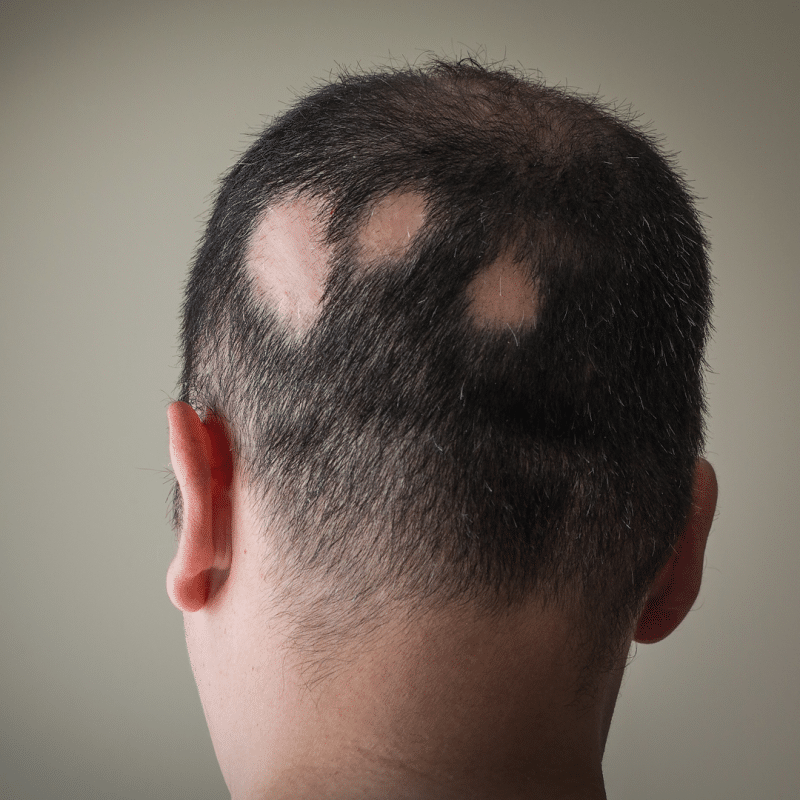There can be many reasons behind a person’s hair loss. Everything from an hormonal imbalance, to vitamin deficiencies to certain lifestyle factors such as exercising, medications, alcohol or drug abuse and lack of sleep, can all have an impact on our hair. This last factor may not necessarily be the first thing most people think about when they reflect on reasons behind hair loss, so how does sleep quality have impact Alopecia Areata?
What is Alopecia Areata?
Alopecia Areata (AA) is an autoimmune disease that specifically targets hair follicles resulting in severe hair loss at a premature age. It is a globally prevalent condition which affects around 2% of the world’s population. With no gender predominance, this disease affects both men and women of all ages, negatively impacting their health and their quality of life.
Alopecia Areata primarily affects the scalp, but in some cases may also have an impact on eyebrows, beard, and other hairy parts of the body. The shedding of hair usually starts in the form of patches, which in time extend to the whole scalp, predisposing the individual to early balding. This premature hair loss can impact various aspects of a person’s life, and pave the way to psychosocial consequences too. This condition can in fact cause increased anxiety among patients and can also raise their risk of developing psychological and psychiatric complications.
 How does sleep quality impact hair?
How does sleep quality impact hair?
Researchers have identified several factors that are thought to actively contribute to the development and severity of AA. Although these factors might not directly cause Alopecia Areata, they act as a trigger in the onset and/or exacerbation of the disease. One of these factors, is sleep quality.
Sleep deprivation, or low quality of sleep, is known to negatively impact the immune system and therefore the overall health and well-being of a person. Poor sleep quality also induces stress which can furthermore overtly activate the immune system. This deranged immunity caused by sleep deprivation is not only restricted to the dampened response against pathogens, but may also involve the breakdown of immunologic self-tolerance, thereby driving the development of autoimmune diseases.
Research on hair loss and sleep deprivation
Although overall research focusing on the connection between Alopecia Areata and sleep quality is limited, various studies have proved that sleep deprivation is connected with a number of other autoimmune diseases such as systemic lupus erythematosus, rheumatoid arthritis, ankylosing spondylitis, and Sjogren’s syndrome, among others. Research has also suggested that Obstructive Sleep Apnea (OSA) can also increase the risk of developing an autoimmune disease, thus strengthening the case that Alopecia Areata, which is classified in the same category, is also in some way related to a lack of sleep or a poor sleep quality.
A 2018 study conducted on the Korean population has showed that patients under the age of 45 who suffered from low quality sleep, had a higher risk of acquiring AA. In addition, these individuals were stated to be more prone to developing other comorbid conditions due to dysfunctional sleeping patterns, such as autoimmune thyroiditis, vitiligo, rheumatoid arthritis, and solid-organ neoplasia.
A previous research conducted in Taiwan in 2015 focused instead on individuals with sleep disorders, which also found that patients with disturbed sleeping patterns had a higher risk of developing autoimmune conditions.
However, an even earlier 2013 study, which was again conducted in Taiwan, used the Epworth Sleep Scale (ESS) to evaluate Excessive Daytime Sleepiness (EDS) in patients with Alopecia Areata and other healthy individuals, and had some contradictory results. In that case, researchers found that only 11.4% of patients with AA had symptoms of EDS, while others had ESS scores that indicated normal sleep quality. Therefore, the study concluded that the quality of sleep did not have a significant association with hair loss.
Another way of approaching this is to consider that Alopecia Areata is associated with low self-esteem, anxiety and other psychiatric disorders that on their own contribute to a decreased quality of life and a consequent worsening of an individual’s sleep quality. A further study in fact revealed that poor sleep quality was more common among patients with hair loss compared to the healthy population, but the difference in the severity of sleep disorders between the two groups was not statistically significant.
Conclusion: Does sleep quality have an impact on Alopecia Areata?
Multiple pieces of research have concluded that unhealthy sleeping habits or low sleep quality can negatively impact the immune system. This can result in the development of Alopecia Areata and other autoimmune diseases in individuals who are already genetically predisposed to such conditions. Therefore, health care professionals recommend that good sleeping habits should be practiced by individuals of all ages.
References:
Villasante Fricke, A. C., & Miteva, M. (2015). Epidemiology and burden of alopecia areata: a systematic review. Clinical, cosmetic and investigational dermatology, 8, 397–403.
Simakou, T., Butcher, J. P., Reid, S., & Henriquez, F. L. (2019). Alopecia areata: A multifactorial autoimmune condition. Journal of autoimmunity, 98, 74-85.
Seo, H. M., Kim, T. L., & Kim, J. S. (2018). The risk of alopecia areata and other related autoimmune diseases in patients with sleep disorders: a Korean population–based retrospective cohort study. Sleep, 41(9), zsy111.
Inui, S., Hamasaki, T., & Itami, S. (2014). Sleep quality in patients with alopecia areata: questionnaire‐based study. International journal of dermatology, 53(1), e39-e41.
Güleç, A. T., Tanrıverdi, N., Dürü, Ç., Saray, Y., & Akçalı, C. (2004). The role of psychological factors in alopecia areata and the impact of the disease on the quality of life. International journal of dermatology, 43(5), 352-356.
Hsiao, Y. H., Chen, Y. T., Tseng, C. M., Wu, L. A., Lin, W. C., Su, V. Y. F., … & Lee, Y. C. (2015). Sleep disorders and increased risk of autoimmune diseases in individuals without sleep apnea. Sleep, 38(4), 581-586.
